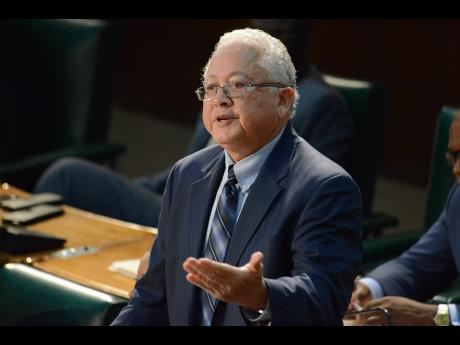Justice in three years - Chuck bats for speedier trials
Justice Minister Delroy Chuck believes that the reasonable time guarantee set out in the Jamaican Constitution for accused persons to have their cases determined by the court should be three years.
The suggestion comes in the wake of a number of failed attempts by local defence attorneys who invoked the constitutional provision to have murder charges against a number of accused persons who waited more than a decade to have their day in court quashed.
Chuck, seeking to support this view, pointed to Canada, where, according to him, the Supreme Court has stipulated that criminal cases in the Canadian high court must be completed 30 months after an accused has been arrested and charged and 18 months in the lower courts.
"Otherwise, the constitutional right of the accused [to a fair trial within a reasonable time] has been breached," he argued yesterday during the justice ministry's quarterly press briefing.
The justice minister believes that Jamaica should follow suit but with more leeway for law enforcement authorities. "We need to go that route so that after a period of time, I would say three years ... " he said, without completing his remarks.
Four east Kingston men who waited 13 years for a second murder trial are among the persons who invoked the constitutional provision in June and asked a high court judge to toss the charges laid against them 17 years ago for the shooting death of a man.
Inconsistencies between the findings of the post-mortem examination and the account given to investigators by the mother of the deceased later forced prosecutors to offer no evidence against all four.
Valerie Neita-Robertson, the attorney who represented the men, described Chuck's suggestion as "wishful thinking" that would expose the Government to numerous lawsuits from persons in custody.
"That would be great, but that's not possible. The system is overburdened in every regard. There are just not enough courts to try all the cases," Neita-Robertson asserted.
"It may happen in one or two matters that the courts push to completion but not in the majority of cases," she added.
Trial of a case depends on several factors - DPP
Director of Public Prosecutions (DPP) Paula Llewellyn has expressed reservations about a suggestion by Justice Minister Delroy Chuck to have accused persons' cases determined by the courts within three years.
However, the nation's chief prosecutor says that the Jamaican judiciary is already heading in that direction under the leadership of Chief Justice Bryan Sykes.
"In an ideal world, that would be the desired objective of being able to quantify what is trial within a reasonable time," said Llewellyn.
"But the trial of a case depends on the intersection of a lot of factors, most of which are not necessarily within the control of the prosecutor because in the final analysis, you are dealing with the human factor," she added.
As an example, Llewellyn said that she had seen cases in which witnesses gave an undertaking that they were "ready to go into the witness box, swear and tell the truth about what I saw."
"But midway, after lunch or overnight, something get to them in the atmosphere, and the next day is a different person you are seeing," Llewellyn said.

